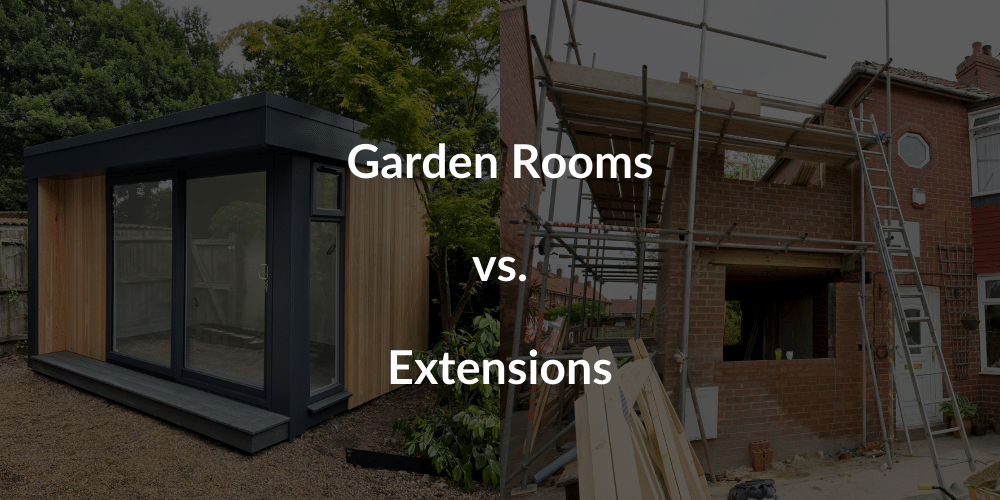Average UK house prices have risen by 160% from 1996 to the present day, in large part due to a shortage of housing, so it’s little wonder that more homeowners are turning to making the most of the space they have rather than moving.
At the same time, long-term remote work has continued to grow in popularity, with workers searching for a dedicated space to run their businesses from. Unless you live in urban city centres (where space is already at a premium), it can be very difficult to find shared office space or hot desk service.
Garden office buildings and extensions both offer more household space, however which of the two is best for your needs? Let’s take a look.
Garden rooms vs. home extension – points to consider:
- What do you intend to use the space for?
- Add extra value to your home
- Consider the cost of the build
- Do you need planning permission?
- What will the time investment be?
What do you intend to use the space for?
As both extensions and garden offices provided much sought-after space, it’s important to first consider what you want to use the extra space for.
While extensions can extend existing rooms or add entirely new rooms, garden rooms create a separate space that can be used for just about anything. From a home gym to a reading room, there’s no limit to what a garden room can achieve.
For remote workers, garden offices also add privacy and physical separation from the main building, which can be a big plus for those with busy households, or for those who prefer to work in a space dedicated to just that. A garden room also comes with complete insulation, meaning that you can work from this space without worrying about outside temperatures.
Add extra value to your home
Extending your property can significantly increase the value of your home, transforming your property completely by adding in extra light, space and more. At the same time, you may be surprised to find out that a quality garden office can also add a large amount of value to your home, with demand for these buildings climbing since the pandemic.
Estate agents recognise that there is a booming market for homes with a dedicated area to work, and buyers are willing to pay a premium for this. In fact, one of our customers added £90k to their property value following the construction of their garden office.
Consider the cost of the build
While extensions can completely transform the appearance of your home, they do also require considerable financial investment. Aside from the cost of materials and labour, there are also initial fees for architectural design work to keep in mind.
During the extension, there is also the potential for damage to be caused to the house itself, which will take time and money to rectify. It is quite feasible that the extension will work out to be more expensive than you initially expected.
On the other hand, the price for a garden office includes all of the materials and labour required. There are no hidden or unknown fees, and the upfront pricing can be clearly broken down for your consideration.
What will the time investment be?
It is also important to understand what the time investment will be when opting for a complete extension of your property. The entire process for an extension may take between 7 and 15 months.
It is likely that foundations will need to be installed, which can cause disruption to your working schedule, on top of the construction process itself. Multiple services are often involved when building an extension, including plastering, electrical work, flooring and more. This creates the potential for delays resulting from illness and lateness which should also be considered.
Garden offices do not require such an extensive time investment, with garden rooms from Garden Office Buildings, requiring 2-3 weeks on average for construction. This means you’ll soon be able to enjoy the many benefits that garden offices bring.
Do you need planning permission?
Traditional home extensions will most likely require planning permission – waiting for this may add weeks to the project completion time and permission is not necessarily guaranteed. Garden rooms that follow set development guidelines do not require planning permission.
Here at Garden Office Buildings, our standardised range of garden rooms do not normally require planning permission, as they follow the required guidelines. This helps to shorten the survey and construction time.
Summing up:
Taking into account the time and cost investment, as well as the requirement of planning permissions, we highly recommend considering a garden office over a traditional home extension if space permits.
Home extensions and garden rooms both provide much-needed space in a market where space is at a premium. However, garden rooms also offer a fantastic amount of utility, especially for remote workers looking to create an office area separate from the main building.
Interested in learning more about garden rooms in Kent? Our friendly team would be happy to discuss this with you further – call us today on 01689 818 400 or get in touch via email at info@gardenofficebuildings.co.uk. You are also welcome to fill in our quick and easy online form here.


